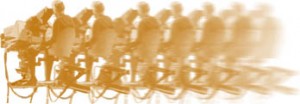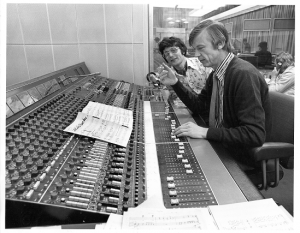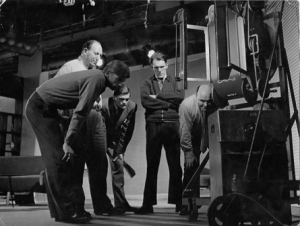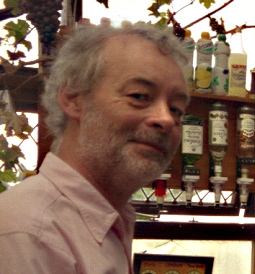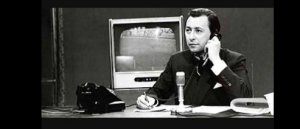Jim Atkinson
Brian Curtis
I recall Jim had a very "nimble" way of "palming" his ciggie – even when in conversation with the Fire Officers!
Peter Hider
Regarding Jim secreting a rollup in his hand I can remember seeing the fire officer’s nose twitching as he spoke to Jim but as far as I remember he was never caught red (or burnt) handed during the 14 years I was with him. Philip Saville, however, was. The fire officer asked him politely to extinguish the enormous cigar he was smoking. Philip inhaled deeply so the end glowed. He threw it on the studio floor and said loudly "There’s a fire, put it out". The FO stood on the dog-end and without comment left the studio. A few minutes later the FO returned with the Grand Fromage, all scrambled egg and epaulettes. The chief stopped the production and demanded an apology to the junior officer from Philip who proceeded to give a wonderful erudite and grovelling apology that lasted much longer than necessary and ultimately the two officers looked embarrassed and left with an admonition not to do it again. As the studio doors closed Philip extracted another expensive cigar and lit up.
Jim’s less expensive roll-ups, clasped between his thumb and index finger, required a Ritzla paper and about five strands of Old Holborn. They rarely lasted longer than one of his developing shots.
Bimbi Harris
Simon Vaughan
(Archivist of APTS – Alexandra Palace Television Society)
Bimbi started her broadcasting career during the war as a recording engineer at Broadcasting House.
She then progressed through various technical jobs to become a Director at the beginning of ITV in 1955 – firstly with A-R (Associated-Rediffusion) and later at London Weekend Television (when ATV lost the London weekend franchise). During this "progression through the ranks" Bimbi transferred to the BBC Television Service at Alexandra Palace and achieved the distinction of being the first camerawoman for the BBC!
We have a newspaper report of this achievement, (featuring a photograph of Bimbi on an Emitron camera), in the APTS Archive. Bimbi donated this herself several years ago, and was always delighted that she had this accolade!
When Bimbi died, she was 95 years of age.
see also:
Bimbi Harris(and other sections)
Bill Jenkin
I didn’t know Bimbi Harris but the interesting thing is that we all thought that Barbara Franc was the first female camera person in 1974. The newspaper article can be viewed on this link (it is a wonderfully non-pc piece from that era).
http://www.flickr.com/photos/aptsarchive/10981212513/
Alan Stokes
I have a vague recollection of the ‘Bimbi Harris’ screen credit, in the days of Associated-Rediffusion, appearing as a ‘signature’, some years before those of Stan Dorfman and, I think, Ray Butt. Was she the first to do it?
Bob Coles
John Henshall
Bob was my ‘trained operator’, to whom I was attached when I joined Crew 4 in 1961. He was always generously knowledgeable and kind mentoring this green teenager, fresh from the sticks, i.e. Stockport.
In 1980 he, along with A J ‘Mitch’ Mitchell, left the BBC to join me in setting up our early single camera unit, Tarn Ltd. Mitch soon accepted an offer he couldn’t refuse from the Moving Picture Company but Bob and I had some amazing times working together. Bob coined our phrase, "Tarn – Video the Film Way".
On one occasion we shot a “Tomorrow’s World” for the BBC, about aircraft simulators. The BBC didn’t have cameras (Sony BVP330P) which were sensitive enough to shoot in the incredibly low light of the cockpit and simulator display. We did, thanks in no small part to Bob’s engineering skills – no doubt in turn thanks to the engineering foundations we had received at BBC ETD Evesham, but never used at the Beeb. I was DoP and also operated two x one-inch VTRs, while Reg Hutchins (EM) and another guy from Windmill Avenue looked over us to make sure everything was up to BBC standard. We weren’t allowed credits because the use of our facilities was "sensitive politically". Of course, we both knew Reg and had a great reunion.
This shoot led to us getting work in the US for their military simulators. We shot dozens of Sun newspaper commercials, Alan Sugar’s first commercials, “Spitting Image”’s Maggie Thatcher special, music videos … you name it. And the wonderful soft-spoken Bob Coles was still my mentor – and guru – and now business partner. Some years later, we packed up Tarn when the world and his wife all had single cameras and rates plummeted.
Bob should have been a writer (he was) and a major producer and director. He was a producer in later years. He always knew, it seemed instinctively, what was right and wrong with a script. Our clients loved him. I loved him and owe him an immense debt of gratitude.
This is just a real appreciation for one of the most wonderful people I have met in my career.
Geoff Fletcher
I remember Bob Coles well from my early days at TC – always a kind and thoughtful chap, and with a wry sense of humour. I think he was with Crew 4 when I first joined it at TC in October 1963, and he was certainly on 4 in 1966 when I again had the pleasure of being a member of that happy team. I recall many of us were surprised when he decided to move to Ally Pally.
Christopher Barry
Roger Bunce
Christopher Barry was one of those ace Directors from the Golden Age of Television – noted for his work on “Doctor Who”, but also “Z-Cars”, “Poldark”, “The Onedin Line”, “Paul Temple”, “Juliet Bravo”, and so many of those classic studio drama series. A very talented man and always a pleasure to work with.
Clive Doig
Christopher Barry was a lovely man to work with, especially in those early days of “Doctor Who”.
Des Browning
Pat Heigham
Just before I departed TVC for other pastures, Des was appointed Head of Sound after Sam Hutchings. He was always very much a ‘hands on’ chief, who always made a tour of the sound galleries of a morning to have a chat, probably to shorten his desk duties! but also to get to know the people under him, and that he wasn’t a faceless middle management type.A good bloke.
Len Shorey
Des came to the Centre from London OB’s with a fresh and enthusiastic outlook to the future of television sound. He was responsible for the first multi track desk and tape machine to be used in any TV studio region, this was TMS. The Television Music Studio, Lime Grove (before this, the studio was the old Studio H.)
This refreshing change from the old policy of little or no equalisation, limiter/ compressor or multitrack facilities and had a profound effect on future mixing techniques and attitudes.
The desk in TMS was a Neve 8 track into a Scully 8 track tape machine. This equipment will put a smile on some of our younger colleagues’ faces but remember this was pioneer days. The studio over the years was well used and some very good music recorded and it built up a good reputation with musicians and production staff.
This photo was taken for a BBC publicity project, my friend to my right is the late Neil Sadwick.
This is the original desk that Des Browning was responsible for.
The desk will bring back many memories to all the regional sound staff who attended, in my opinion, the excellent hands on courses provided by TVC sound dept.
Mike Giles
A DSB story: he strode into the Talk of the Town from the scanner, after a day of moaning by the MD (who?) about his cans feed. Des ripped the cans off the MD’s head , syrup and all, and the rest, as they say, is history!
Rick Gardner
Peter Cook
Formerly known as Jack. He ‘upgraded’, I think, on his promotion to production. Lovely story on a “Disco” shoot, a short lived live OB music quiz show featuring Terry Wogan. Closing captions and ‘Director Rick Gardner’ was wonky. He screamed, "There is something wrong with my caption!!!" Vision supervisor Frank instantly injected on talk back, "Yes – there is a ‘P’ missing from it".
Forever afterwards Jack fondly became known on OBs as P-Rick. But that was in 1975.
Dickie Chamberlain
Pat Heigham
Dickie Chamberlain… used to reproduce the studio recordings of the pop groups’ efforts, for “Top of the Pops”, in LG Studio G with a sound desk which was very limited in channels.
His trick with strings (probably only a max of six) was to mic them all with a neck mic, and put a ton of echo on ! No EQ in those days.
John Howell
Dickie used to carry around a copy of Jim Reeves "Distant Drums" and if he had any doubts about the desk, monitoring, or loudspeaker in a particular studio he would play it because he knew how it should sound. Not the most demanding record but you get the point. He didn’t pile on the EQ in the loudspeaker feed, he merely made an allowance for what he heard.
The EMI desk in Studio G did have EQ but so few modules that they were needed for mic channels, remember those Touchel insert cords that carried both ‘go’ and ‘return’?
I’m not certain but Dickie may have paralleled the personal mics on the strings when he was short of channels!
Tiny Nelson
Len Shorey
Watching football from floor of Lime Grove.
The big chap behind me we called ‘Tiny’: he ran the sparks and he was as strong as a lion.
Maurice Fleisher
Gosh…..Tiny. I remember him for one special reason. During a live show I was on a Vinten motorised dolly and my tracker ran right over a cable at the back, which promptly brought us to a complete stop. Fortunately I wasn’t on shot at that moment. Suddenly I felt the whole back end of the dolly rise into the air as the cable was kicked away and then I was gently lowered to the floor. That was Tiny on his own. The viewing public had no idea some of the things that happened whilst on air.
Peter Hider
If we are talking about Tiny the gaffer then I think it might have been Tiny Nelson, whose son Derek Nelson became a Production Unit Manager in Drama Films where I worked with him on a number of films. Tiny gave us a memorable moment in studio D at the Grove when during rehearsal for a quiet and, for the BBC , steamy love scene he was heard to shout from the grid, in his inimitable Cockney accent, "Do you want it up a bit further?" . He was of course referring to a lamp.
Alex Thomas
Tiny the electrician … I once saw drag a 5K up a stepladder with one hand and place it gently on a lighting bar about 10 feet high.
Now that took strength.
Dudley Darby
Tiny Nelson, lovely guy. After an electricians’ strike he virtually single-handedly rigged lights on block and tackle in Studio D Lime Grove to get a live programme on air that evening (a “Panorama”, I think). His son Derek later became a Production Manager in Drama.
Joe Waters
Trevor Webster
Joe Waters died at the age of 89. Memories of “Warship” and “The Enigma Files” for me but he also produced – “Don’t Forget to Write”, “My Family and Other Animals”, “Uncle Silas”, “My Brother Jonathan”, “Swallows and Amazons”, and even “Dixon of Dock Green” for a time. I didn’t know that he started as a scene shifter at LG and AP!
Mike Jones
From Michael Cotton
Mike Jones on 5th October 1996.
Peter Neill
Mike was, of course, a Sound Supervisor (“Fawlty Towers” among many others) and later manager.
David Coleman
Patrick Heigham
I used to work on “Grandstand”, and had an immense respect for David Coleman’s professionalism.
I recall a moment when something exciting happened on an OB – Director tells David Coleman to link to remote – as David is delivering to camera, he suddenly gets the message, "We don’t know who the commentator is!" Without breaking step, David says "So over now…….to our man on the spot!"
Mike Baker
My own personal recollection of David Coleman was at Aintree immediately following the Grand National. I was on Racks (working out of Manchester OB’s) and was called out to move the monitor from inside the commentary hut to the open area adjoining, as David wanted to be seen in foreground with the winners behind. Unfortunately, there wasn’t enough spare length on the video so I had to think quickly. Remember the Sony Trinitrons? One of their plus points was their sensitivity, so my trusty screwdriver in the aerial socket actually got enough signal to display BBC1 which was what he wanted in order to be able to read the results live off Network as transmitted. So there I was, screwdriver in aerial socket whilst trying to see the screen at the same time as he did the voiceover. Any pauses in his delivery were attributable to me frantically trying to retrieve signal from noise with my No 1 screwdriver! I do remember him giving me a small ‘thank you’ smile after we came off air. At least, that’s what I would like to think!
“Hello From Mexico”
Chris Booth
“Hello from Mexico” was originally editing audio only by Ed Wooden, who top and tailed it with the title music.
Somehow (and I know that man) Kenny Everett got hold of a copy and played it on his radio show.
I happened to be stuck in a traffic jam in Hammersmith and everyone was falling out of their (stationary) cars in hysterics!
Bill Cotton
Pat Heigham
Crew 3 in the TVT for both the “Black and White Minstrel Show” and “The Billy Cotton Band Show”- always had a huge bag of sweets just under the head of Camera 1 on the Mole. The girls and boys would come and help themselves during rehearsal. Bill Cotton spotted this one day and asked who provided and paid for them – Eddy Stewart replied, "The crew, guv".
Bill Cotton beckoned me over, as I was standing near, and instructed me to go to the corner shop (remember that? Top shelf mags and sweeties!) and get some sweeties – courtesy of Bill. He gave me five bob, when the original bagful probably cost around a pound in those days!
Skinflint!
Dave Plowman
I remember going to a very decent party at Jack Straw’s Castle after the “The Billy Cotton Band Show” series when we had moved to the Hippodrome while the theatre was undergoing major surgery. Such things for the entire crew weren’t that common then, so perhaps not so much of a skinflint?
Hugh Sheppard
Who’s to really know?
In the middle of a junction in NC1 in the late 60’s, Bill Cotton burst in and asked for ‘ten bob’ as he’d mislaid his wallet. Having whisked it away, I was determined that wouldn’t be the last I’d see of it, so tackled him once, twice, three times over the next few weeks before heading for his office where ‘Queenie’ sorted it from her handbag.But 20 years later we met up when he came out to Australia for a Perth TV Conference. The post-event party said ‘black tie’, so I persuaded him to bring out his own DJ. Once in the hall, we were the only ones in monkey-suits apart from the waiters! At the time I had a boss to do without, and Bill caught my mood. “Never resign” he said. “Never, ever resign from the BBC”. It was very good advice that stood me in very good stead for my pension. Thank you Bill.
